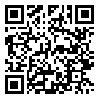Volume 25, Issue 1 (5-2022)
Hakim 2022, 25(1): 63-77 |
Back to browse issues page
Download citation:
BibTeX | RIS | EndNote | Medlars | ProCite | Reference Manager | RefWorks
Send citation to:



BibTeX | RIS | EndNote | Medlars | ProCite | Reference Manager | RefWorks
Send citation to:
Ahmadi A, Salarnezhad A A. Investigating the impact of psychological and technical factors of adoption of smart information technology on the digital resilience of Iran’s health sector. Hakim 2022; 25 (1) :63-77
URL: http://hakim.tums.ac.ir/article-1-2174-en.html
URL: http://hakim.tums.ac.ir/article-1-2174-en.html
1- Master`s degree in information technology management, information resource management. Faculty of management, Islamic Azad University Electronic Department, Tehran, Iran.
2- Assistant professor in information technology management, Business intelligent (BI), Department of Management, Faculty of Management and Military Sciences, Imam Ali University, Tehran, Iran. ,alisalarnejad@gmail.com
2- Assistant professor in information technology management, Business intelligent (BI), Department of Management, Faculty of Management and Military Sciences, Imam Ali University, Tehran, Iran. ,
Abstract: (992 Views)
Introduction: In line with the importance of digital resilience in the health sector, especially during pandemic periods, and the double work and psychological pressure on the employees of such organizations, the purpose of this research is to investigate the impact of psychological and technical factors of adopting smart information technology on resilience” Digital is Iran’s health sector.
Methods: In terms of purpose, this research is an applied descriptive survey. Data were collected using a questionnaire with 28 questions performed on a statistical sample of 200 Alborz University of Medical Sciences employees. Participants were selected using a simple random sampling technique. The digital resilience questionnaire developed by García Perez et al. was employed. Structural equation modeling, which was administered using PLS software, was used to test the hypotheses.
Results: Individual innovation behavior of healthcare workers on digital resilience (by a variable of 0.211); Self-efficacy of employees (0.367); Perceived benefits of the system (0.302); the level of professional knowledge of employees (0.369); and the level of conservatism of healthcare workers (0.329), presented a positive effect on digital resilience. However, the motives for using information systems, the complexity of the system, and the knowledge of using technology do not affect digital resilience in the health sector.
Conclusions: Improving the procedures for identifying talents, raising the level of professional knowledge of employees by holding on-the-job training courses and workshops with a focus on Professional knowledge, and spreading the culture of innovation and self-efficacy in the health sector can increase Digital resilience, indicating the need for more attention of managers.
Methods: In terms of purpose, this research is an applied descriptive survey. Data were collected using a questionnaire with 28 questions performed on a statistical sample of 200 Alborz University of Medical Sciences employees. Participants were selected using a simple random sampling technique. The digital resilience questionnaire developed by García Perez et al. was employed. Structural equation modeling, which was administered using PLS software, was used to test the hypotheses.
Results: Individual innovation behavior of healthcare workers on digital resilience (by a variable of 0.211); Self-efficacy of employees (0.367); Perceived benefits of the system (0.302); the level of professional knowledge of employees (0.369); and the level of conservatism of healthcare workers (0.329), presented a positive effect on digital resilience. However, the motives for using information systems, the complexity of the system, and the knowledge of using technology do not affect digital resilience in the health sector.
Conclusions: Improving the procedures for identifying talents, raising the level of professional knowledge of employees by holding on-the-job training courses and workshops with a focus on Professional knowledge, and spreading the culture of innovation and self-efficacy in the health sector can increase Digital resilience, indicating the need for more attention of managers.
Keywords: psychological factors, technical factors, adoption of smart information technology, digital resilience, health sector
Type of Study: Applicable |
Subject:
General
Received: 2023/01/15 | Accepted: 2022/05/31 | Published: 2022/05/31
Received: 2023/01/15 | Accepted: 2022/05/31 | Published: 2022/05/31
Send email to the article author
| Rights and permissions | |
 |
This work is licensed under a Creative Commons Attribution-NonCommercial 4.0 International License. |






